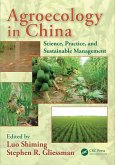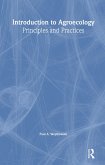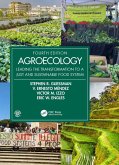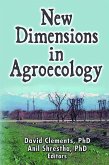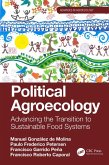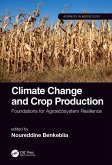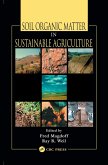Agroecology (eBook, ePUB)
A Transdisciplinary, Participatory and Action-oriented Approach
Redaktion: Méndez, V. Ernesto; Gliessman, Stephen R.; Cohen, Roseann; Bacon, Christopher M.


Alle Infos zum eBook verschenken

Agroecology (eBook, ePUB)
A Transdisciplinary, Participatory and Action-oriented Approach
Redaktion: Méndez, V. Ernesto; Gliessman, Stephen R.; Cohen, Roseann; Bacon, Christopher M.
- Format: ePub
- Merkliste
- Auf die Merkliste
- Bewerten Bewerten
- Teilen
- Produkt teilen
- Produkterinnerung
- Produkterinnerung

Hier können Sie sich einloggen

Bitte loggen Sie sich zunächst in Ihr Kundenkonto ein oder registrieren Sie sich bei bücher.de, um das eBook-Abo tolino select nutzen zu können.
This is the first book to focus on agroecology as a transdisciplinary, participatory, and action-oriented process. Using a combined theoretical and practical approach, this collection of work from recognized and pioneering researchers and practitioners engages social actors on different geo-political scales to transform the global agrifood system. In addition to illustrating systems of agroecology that will improve food systems around the world, it lays the groundwork for further innovations to create better sustainability for all people, ecologies, and landscapes.
- Geräte: eReader
- mit Kopierschutz
- eBook Hilfe
![Agroecology in China (eBook, ePUB) Agroecology in China (eBook, ePUB)]() Agroecology in China (eBook, ePUB)52,95 €
Agroecology in China (eBook, ePUB)52,95 €![Introduction to Agroecology (eBook, ePUB) Introduction to Agroecology (eBook, ePUB)]() Paul WojtkowskiIntroduction to Agroecology (eBook, ePUB)125,95 €
Paul WojtkowskiIntroduction to Agroecology (eBook, ePUB)125,95 €![Agroecology (eBook, ePUB) Agroecology (eBook, ePUB)]() Stephen R. GliessmanAgroecology (eBook, ePUB)94,95 €
Stephen R. GliessmanAgroecology (eBook, ePUB)94,95 €![New Dimensions in Agroecology (eBook, ePUB) New Dimensions in Agroecology (eBook, ePUB)]() Anil ShresthaNew Dimensions in Agroecology (eBook, ePUB)133,95 €
Anil ShresthaNew Dimensions in Agroecology (eBook, ePUB)133,95 €![Political Agroecology (eBook, ePUB) Political Agroecology (eBook, ePUB)]() Manuel González de MolinaPolitical Agroecology (eBook, ePUB)49,95 €
Manuel González de MolinaPolitical Agroecology (eBook, ePUB)49,95 €![Climate Change and Crop Production (eBook, ePUB) Climate Change and Crop Production (eBook, ePUB)]() Climate Change and Crop Production (eBook, ePUB)72,95 €
Climate Change and Crop Production (eBook, ePUB)72,95 €![Soil Organic Matter in Sustainable Agriculture (eBook, ePUB) Soil Organic Matter in Sustainable Agriculture (eBook, ePUB)]() Soil Organic Matter in Sustainable Agriculture (eBook, ePUB)66,95 €
Soil Organic Matter in Sustainable Agriculture (eBook, ePUB)66,95 €-
-
-
Dieser Download kann aus rechtlichen Gründen nur mit Rechnungsadresse in A, B, BG, CY, CZ, D, DK, EW, E, FIN, F, GR, HR, H, IRL, I, LT, L, LR, M, NL, PL, P, R, S, SLO, SK ausgeliefert werden.
- Produktdetails
- Verlag: Taylor & Francis eBooks
- Erscheinungstermin: 18. November 2015
- Englisch
- ISBN-13: 9781040077092
- Artikelnr.: 72282102
- Verlag: Taylor & Francis eBooks
- Erscheinungstermin: 18. November 2015
- Englisch
- ISBN-13: 9781040077092
- Artikelnr.: 72282102
- Herstellerkennzeichnung Die Herstellerinformationen sind derzeit nicht verfügbar.
Action-oriented Approach. Agroecology: Roots of Resistance to
Industrialized Food Systems. Transformative Agroecology: Foundations in
Agricultural Practice, Agrarian Social Thought, and Sociological Theory.
Political Agroecology: An Essential Tool to Promote Agrarian
Sustainability. Learning Agroecology through Involvement and Reflection.
Complexity in Tradition and Science: Intersecting Theoretical Frameworks in
Agroecological Research. Agroecology, Food Sovereignty, and the New Green
Revolution. The Intercultural Origin of Agroecology: Contributions from
Mexico. Participatory Action Research for an Agroecological Transition in
Spain: Building Local Organic Food Networks. Agroecology, Food Sovereignty,
and Urban Agriculture in the United States. On the Ground: Putting
Agroecology to Work through Applied Research and Extension in Vermont.
Agroecology as a Food Security and Sovereignty Strategy in Coffee-Growing
Communities: Opportunities and Challenges in San Ramon, Nicaragua. The
Mesoamerican Agroenvironmental Program: Critical Lessons Learned from an
Integrated Approach to Achieve Sustainable Land Management. Analysis of
Tropical Home Gardens through an Agroecology and Anthropological Ecology
Perspective.
Action-oriented Approach. Agroecology: Roots of Resistance to
Industrialized Food Systems. Transformative Agroecology: Foundations in
Agricultural Practice, Agrarian Social Thought, and Sociological Theory.
Political Agroecology: An Essential Tool to Promote Agrarian
Sustainability. Learning Agroecology through Involvement and Reflection.
Complexity in Tradition and Science: Intersecting Theoretical Frameworks in
Agroecological Research. Agroecology, Food Sovereignty, and the New Green
Revolution. The Intercultural Origin of Agroecology: Contributions from
Mexico. Participatory Action Research for an Agroecological Transition in
Spain: Building Local Organic Food Networks. Agroecology, Food Sovereignty,
and Urban Agriculture in the United States. On the Ground: Putting
Agroecology to Work through Applied Research and Extension in Vermont.
Agroecology as a Food Security and Sovereignty Strategy in Coffee-Growing
Communities: Opportunities and Challenges in San Ramon, Nicaragua. The
Mesoamerican Agroenvironmental Program: Critical Lessons Learned from an
Integrated Approach to Achieve Sustainable Land Management. Analysis of
Tropical Home Gardens through an Agroecology and Anthropological Ecology
Perspective.

